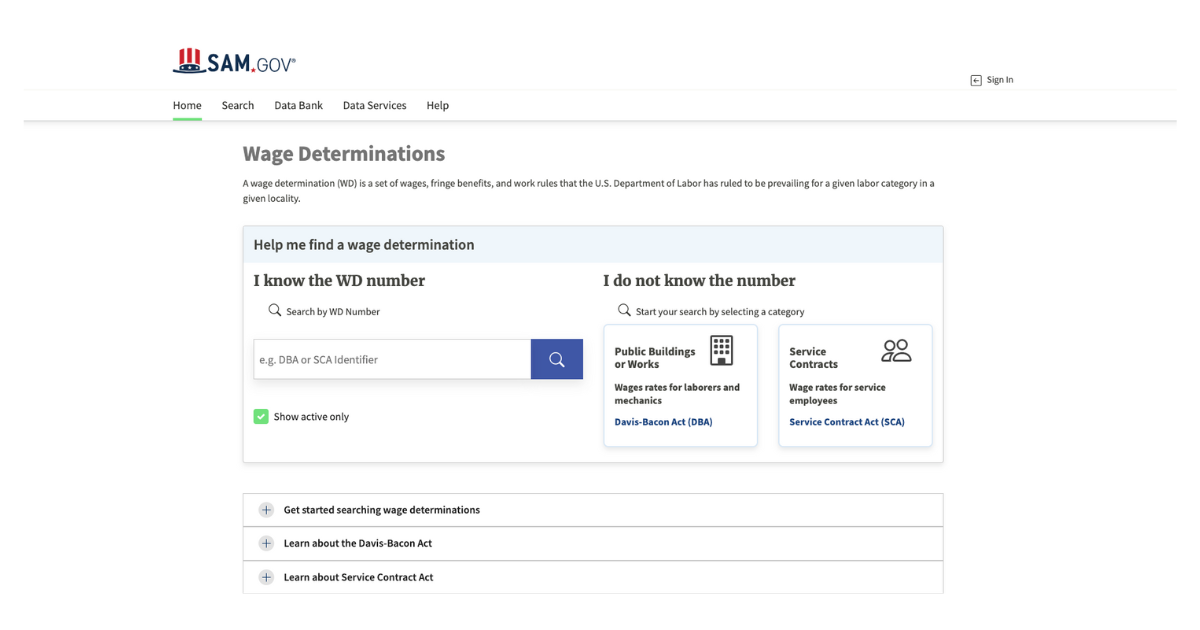Understanding Davis-Bacon exemptions isn't just about compliance, it's about protecting your bottom line. Misclassifying even one worker can result in penalties, back wages, and potential debarment from future government contracts. Whether you're bidding on your first federal project or managing multiple public works contracts, knowing who falls under Davis-Bacon requirements can save your company thousands of dollars and countless headaches.
The Davis-Bacon Act, enacted by Congress in 1931, requires contractors and subcontractors working on federally-funded or federally-assisted construction projects to pay their laborers and mechanics at least the locally prevailing wages and fringe benefits. But not every worker on a government project falls under these davis bacon requirements—and that's where many contractors run into trouble.
This guide breaks down exactly who is and isn't covered under the Davis-Bacon Act, helping you navigate certified payroll reporting with confidence.
Navigate This Article
Why Davis-Bacon Exemptions Matter
Before diving into the specific exemptions, it's critical to understand what's at stake:
Financial Penalties: Contractors who fail to pay Davis-Bacon wages correctly may face penalties including:
- Withholding of contract payments
- Payment of back wages to affected workers
- Liquidated damages
- Civil penalties up to $10,000 per violation
- Contract termination
Debarment Risk: Serious or repeated violations can result in debarment from federal contracts for up to three years, effectively shutting your company out of lucrative government work.
Audit Exposure: The Department of Labor conducts regular audits of certified payroll records. Misclassifying workers as exempt when they should be covered is one of the most common audit findings.
Reputation Damage: Davis-Bacon violations become public record and can harm your company's reputation, making it harder to win future bids.
The good news? Understanding exemptions helps you allocate your labor costs accurately, maintain compliance, and focus your certified payroll reporting efforts where they matter most.
Who Is Covered by the Davis-Bacon Act?
The Davis-Bacon Act applies to laborers and mechanics who perform manual or physical work on the job site. This includes workers who use tools of the trade and are employed by contractors or subcontractors on the "site of the work."
Covered workers include:
- Laborers performing manual tasks on-site
- Mechanics using tools and equipment
- Helpers and trainees working alongside skilled tradespeople
- Apprentices enrolled in registered apprenticeship programs
The key factor is whether the employee is performing physical, manual labor directly related to the construction, alteration, or repair of the public building or public work.
What About Working Supervisors?
This is where Davis-Bacon wage requirements can get tricky. Some supervisors spend part of their time performing manual labor alongside their crews.
The 20% Rule: Supervisors, foremen, and other employees whose primary duties are not manual in nature may still be covered by Davis-Bacon for the portion of time they spend on manual work. If a supervisor spends 20% or more of their workweek performing the duties of a laborer or mechanic, they must be paid prevailing wages for those hours.
For example, a foreman who spends 30% of their time operating equipment or doing hands-on work must be paid the prevailing wage rate for that 30% of their hours worked.
State vs. Federal Davis-Bacon Exemptions
Many contractors work on projects subject to both federal Davis-Bacon requirements and state-level prevailing wage laws. It's important to understand that exemptions can differ:
Federal Davis-Bacon Act: Applies to projects funded wholly or partially by federal dollars, typically contracts over $2,000.
State Prevailing Wage Laws: Many states have their own "Little Davis-Bacon Acts" with varying thresholds, coverage, and exemptions. For example:
- Some states set higher dollar thresholds for coverage
- State exemptions may differ from federal exemptions
- Certain project types may be exempt at the state level but not federal (or vice versa)
- State laws may have different definitions of "construction"
Important: When working on a project subject to both federal and state requirements, you must comply with both sets of regulations. If there's a conflict, the more stringent requirement typically applies. Always review both federal and applicable state prevailing wage requirements for each project.
How to Determine If a Worker Is Exempt

Classifying workers correctly is essential for compliance. Follow this process:
Step 1: Review the Worker's Job Duties
- What is their primary function on the project?
- Do they perform manual or physical labor?
- Do they use tools of the trade?
- Is their work directly related to the construction site?
Step 2: Apply the Primary Duty Test Ask: Is this worker's primary duty executive, administrative, or professional in nature, or is it manual/physical labor?
Workers whose primary duties involve:
- Planning and directing the work of others (executive)
- Performing office or non-manual work (administrative)
- Work requiring advanced knowledge in a specialized field (professional)
...are generally exempt. Those performing manual labor are generally covered.
Step 3: Consider the Work Location Davis-Bacon applies to work performed at the "site of the work." This includes:
- The physical construction site
- A dedicated fabrication site established specifically for the project
- Adjacent areas used exclusively for the project
Work performed at permanent manufacturing facilities, even if the materials will be used on the project, typically doesn't fall under Davis-Bacon coverage.
Step 4: Check for Specific Exemptions Review the list of commonly exempt positions (detailed below) to see if the worker fits into a recognized exemption category.
Step 5: Document Your Classification Keep clear records of:
- Job descriptions and actual duties performed
- Time records showing the percentage of time spent on manual vs. non-manual tasks
- Your reasoning for the exemption classification
When in Doubt: If you're uncertain whether a worker should be classified as exempt, the safer approach is to include them in certified payroll reporting and pay prevailing wages. Incorrectly classifying a covered worker as exempt carries more risk than over-reporting.
Not sure if your workers are exempt? Talk to our compliance experts!
Who Is NOT Covered by the Davis-Bacon Act?
Bona fide executive, administrative, and professional employees are not covered under Davis-Bacon wage requirements. Additionally, several specific job classifications are generally exempt from Davis-Bacon and related acts:
Exempt Positions and Classifications
1. Architects Architects performing professional services related to design and project oversight are exempt. Their work involves specialized knowledge and professional judgment rather than manual construction labor.
2. Engineers Civil, structural, mechanical, and other engineers providing professional engineering services are not subject to Davis-Bacon requirements when performing engineering duties.
3. Timekeepers Administrative employees who track and record worker hours, maintain payroll records, and perform clerical functions are exempt from prevailing wage requirements.
4. Supervisors Supervisors whose primary duty is directing and managing the work of others, and who spend less than 20% of their time performing manual labor—are typically exempt. Remember: if they regularly perform manual tasks for 20% or more of their workweek, they must be paid prevailing wages for those hours.
5. Foremen Similar to supervisors, foremen are exempt when their primary role is supervisory. However, many foremen spend significant time doing hands-on work alongside their crews. Apply the 20% rule to determine if prevailing wages are required for a portion of their hours.
6. Exploratory Drilling Workers Workers performing exploratory drilling services to obtain data for engineering studies, utility location, or project planning are generally exempt. The key distinction is that exploratory drilling is performed to support planning and design rather than as part of the actual construction work. These services include geotechnical investigations and subsurface utility engineering.
7. Railroad Employees Workers employed by railroad companies operating on railroad rights-of-way are typically exempt from Davis-Bacon requirements, even when their work is adjacent to or crosses a covered project.
8. Public Utility Employees Employees of public utility companies performing utility-related work are generally not covered under Davis-Bacon regulations, even when that work is necessary for a covered construction project.
9. Contracting Agency Inspectors Inspectors employed by the contracting government agency (federal, state, or local) to oversee and inspect the construction work are exempt. These are government employees, not contractor employees.
10. Public Agency Force Account Workers Employees of the public agency who are performing construction services on a force account basis (meaning the agency is using its own workforce rather than hiring a contractor) are not covered by Davis-Bacon requirements.
11. Contractor Quality Assurance Inspectors Quality assurance and quality control inspectors who monitor and document construction work but do not perform manual labor are typically exempt from prevailing wage requirements.
12. Material Suppliers and Dealers Businesses and employees who supply materials to the project but do not perform installation or construction work on-site are exempt. This includes:
- Material suppliers delivering products to the job site
- Equipment rental companies
- Ready-mix concrete suppliers
- Lumberyard employees making deliveries
The exemption applies to suppliers who merely deliver materials. If supplier employees install, assemble, or incorporate materials into the project on-site, they may be covered by Davis-Bacon requirements.
13. Survey Crew Members Workers who use surveying equipment to measure distances, elevations, angles, and boundaries are generally exempt when performing survey work. This includes survey technicians and crew members operating total stations, GPS equipment, and other measuring devices. However, survey crews performing construction layout or staking directly related to ongoing construction may be covered.
14. Owner-Operator Truck Drivers Truck owners who drive their own trucks are not covered under certified payroll requirements when they operate their own equipment. These owner-operators must be reported on certified payroll reports with a notation that the work was performed by a named "owner-operator," but their hours and rate of pay are not required to be shown.
Important note: This exemption applies only to bona fide owner-operators who own their trucks and operate them independently. Drivers who are employees of a trucking company or contractor must be paid prevailing wages if they're performing work covered by Davis-Bacon.
15. Federal Youth Program Participants Participants in certain approved federal youth programs are exempt from Davis-Bacon requirements. These programs must have pre-established wage rates, living allowances, and other compensation approved by the U.S. Department of Labor. Exempt programs include:
- Summer Youth Opportunity Programs: Projects sponsored by unions and management groups, or by governmental or community organizations
- American Conservation and Youth Service Corps (AmeriCorps): Members serving in AmeriCorps programs
- Youth Conservation Corps: Participants in YCC programs
- Public Land Corps: Youth working on public lands conservation projects
- Volunteers in Service to America (VISTA): VISTA volunteers engaged in service projects
These exemptions recognize that these programs serve educational and community service purposes with different compensation structures than standard employment relationships.
Navigating Davis-Bacon Compliance

Understanding exemptions is just one piece of the Davis-Bacon requirements puzzle. Successful contractors build systems to:
- Track worker classifications accurately: Document which employees are exempt and why, especially for supervisors who may split time between manual and administrative duties.
- Maintain detailed records: Keep job descriptions, time records, and classification justifications for audit purposes.
- Review classifications regularly: Worker duties can change over time. Periodically verify that exempt classifications remain accurate.
- Train project managers: Ensure everyone involved in hiring and managing workers understands Davis-Bacon coverage and exemptions.
- Streamline certified payroll reporting: Use specialized software to automate prevailing wage calculations, track compliance, and generate accurate certified payroll reports.
Take Control of Your Davis-Bacon Compliance
Misclassifying workers, whether accidentally including exempt employees or mistakenly excluding covered workers, creates unnecessary risk and administrative burden. By understanding these exemptions, you can focus your compliance efforts where they matter most and avoid costly mistakes.
Need help managing certified payroll reporting? Our compliance software automates prevailing wage calculations, tracks worker classifications, and generates audit-ready certified payroll reports—so you can focus on building, not paperwork.



.png)
